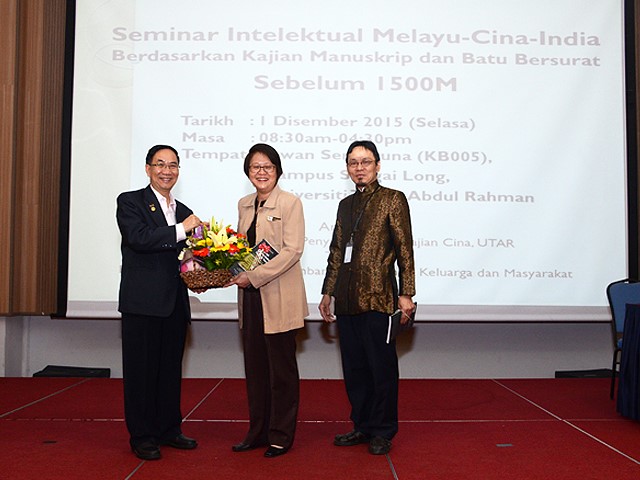

From left: Prof Chuah, Datin Paduka Chew, and Dr Tee
Institute of Chinese Studies (ICS) Sinology Unit hosted a “Seminar Intelektual Melayu-Cina-India Berdasarkan Kajian Manuskrip dan Batu Bersurat Sebelum 1500 Masihi (Malay-Chinese-Indian Intellectual Seminar based on research on Manuscripts and Inscription Stone before 1500CE)” on 1 December 2015.
Present at the opening ceremony were Deputy Minister of Women, Family, and Community Development YB Senator Datin Paduka Chew Mei Fun, UTAR President Ir Prof Academician Dato’ Dr Chuah Hean Teik, UTAR Vice President for R&D and Commercialisation Ir Prof Dr Lee Sze Wei, ICS Dean Dr Chong Siou Wei, and Organising Committee Chairperson Dr Tee Boon Chuan.
Aimed to promote interests in Malay-Chinese-Indian history, this seminar set on examining Malay manuscripts from before 1500CE, particularly those archived in China and India. Additionally, the seminar also envisioned to function as a platform for scholars to discuss tacit knowledge about civilisation from the manuscripts, and to further understand Malay intellectual heritage before 1500CE which has become the fundamentals for modern research.
“Inspired by the discovery of the oldest Malay Manuscript from the 14th century Nitisarasamuccaya, I am very interested in exploring and studying more about local knowledge from other manuscripts and inscriptions before 1500CE,” remarked the chairman of the organising committee and ICS Sinology Unit Dr Tee Boon Chuan. Besides, he announced that the seminar will be held annually in view of the visions of the seminar.
Prof Chuah said, “Malaysia is a potpourri of cultures and languages. Meanwhile, its history is so closely related to China and India. Our role as academics is to study the history and translate these manuscripts into modern languages in order to develop a sense of relevance for the younger generation, and for them to understand the wisdom of their ancestors.”
Greeting in Hindi, YB Senator Datin Paduka Chew said, “This seminar is strong evidence of a diverse society, complementing one another’s strengths and weaknesses for a more dynamic community. The manuscripts were recorded in different languages; therefore studying them requires experts mastering these languages for accurate translation and transcription. I believe this seminar is a good opportunity for scholars to meet prospective partners for future collaborations.” She ended her speech by reciting a poem in Malay which won thunderous applause from the audience.The seminar was divided into two sessions: ‘Jaringan Intelektual Buddhisme Antara Melayu-Cina-India’ chaired by Centre for Civilisational Dialogue Director Dr Faridah Noor Mohd Noor from University of Malaya (UM) and ‘Jaringan Intelektual Hinduisme Antara Melayu- Cina-India’ chaired by Dr Ang Lay Hoon from Universiti Putra Malaysia (UPM).
Topics discussed during the first session included “Hubungan Negara-Negara Kota Awal dengan China: Satu Kronologi” by Nasha Rodzia Khaw from University of Peshawar, Pakistan; “Teks Logik Buddha di Alam Melayu” by Dr Muhammad Alinor Abdul Kadir from the Institute for Mathematical Research, UPM; and “Kesan Falsafah Buddhisme Srivijaya di China dan Tibet” by Dr Tee.
The latter session entailed discussions on “Batu-Batu Bersurat Melayu Sebelum1400 TM” by Dr Kumaran Suberamanian from the Department of Indian Studies, UM; “Pengarangan Semula Epik India di Tangan Pengarang Java dan Melayu Masa Silam” by Prof Dr Ding Choo Ming from Institute of Southeast Asean Studies, Singapore; and “Sumbangan Kitab Arthashastra Karangan Kautilya (Kuran Ke 4 Masehi) Di Dalam Pengurusan Sumber Manusia Alam Melayu” by Dr Balakrishnan Muniapan from Wawasan Open University.
This seminar was jointly sponsored by UTAR ICS and the Ministry of Women, Family, and Community Development.
Wholly owned by UTAR Education Foundation Co. No. 578227-M LEGAL STATEMENT TERM OF USAGE PRIVACY NOTICE